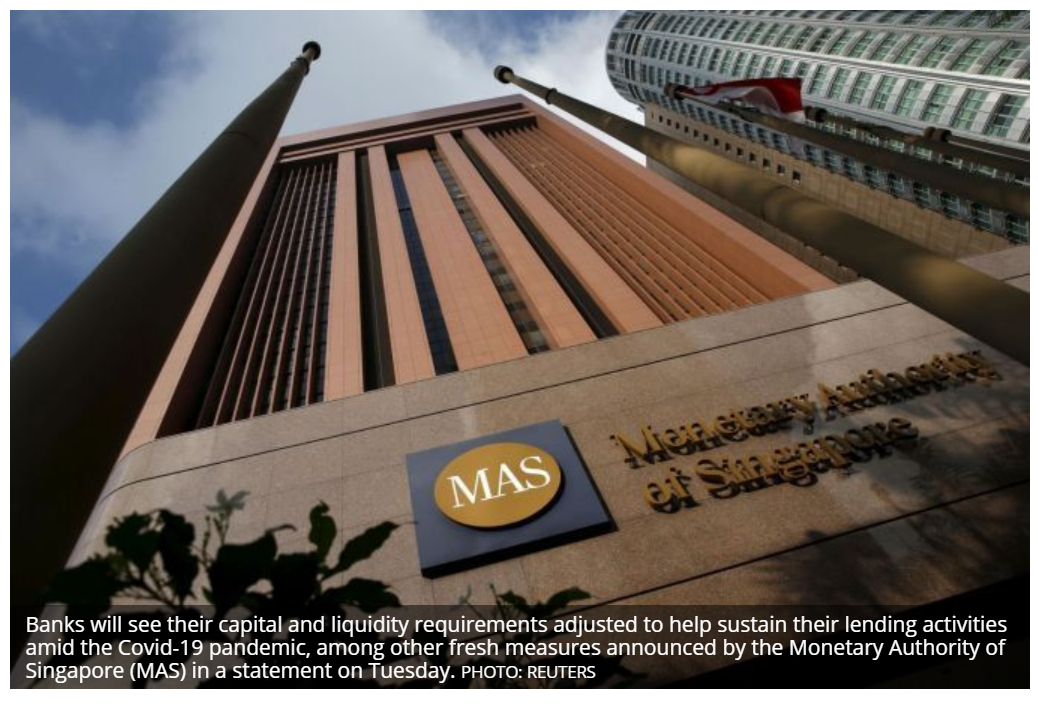Singapore: MAS to adjust banks’ capital requirements amid Covid-19 pandemic
BANKS will see their capital and liquidity requirements adjusted to help sustain their lending activities amid the Covid-19 pandemic, among other fresh measures announced by the Monetary Authority of Singapore (MAS) in a statement on Tuesday.
This move to ease requirements and supervisory programmes of financial institutions (FIs) is to enable them to focus on dealing with issues related to the virus outbreak and support their customers, said MAS.
FIs will be allowed to take into account the government’s fiscal assistance and banks’ relief measures in setting more realistic accounting loan loss allowances. FIs’ implementation of the final set of Basel III reforms, margin requirements for non-centrally cleared derivatives, and other new regulations and policies, will also be deferred to ease their operational burden.
FIs will also get more latitude on submission timelines for regulatory reports and defer non-urgent industry projects, while regular on-site inspections and supervisory visits will be suspended till further notice.
The new measures will effectively put a stop to banks’ share buyback activities. In its statement, MAS said that the release of capital buffers “should not be used to finance share buybacks during this period”.
The three local banks – DBS, OCBC and UOB – have been on a share buyback spree in the past few months. In March, the trio had led a S$502 million buyback consideration tally on the Singapore Exchange, accounting for 88 per cent of the total.
Instead, MAS urged banks to utilise their capital buffers as appropriate to support their lending activities and flagged that “sustaining lending activities should take priority over discretionary distributions”.
But Singapore’s central bank “does not see a need to restrict banks’ dividend policies”, an approach that differs from the UK, where the Bank of England intervened with UK banks to cancel dividends.
In addition, MAS will allow full recognition of regulatory loss allowance reserves (RLAR) as Tier 2 Capital for banks to enhance their capacity to lend. RLAR is part of lenders’ loss allowances, which are currently only granted limited recognition as Tier 2 Capital. The relief will apply until Sept 30, 2021, and may be extended if necessary.
Banks may also utilise their liquidity buffers as necessary to meet liquidity demands. To support banks’ lending activities, MAS will adjust the net stable funding ratio requirement. The amount of stable funding that banks must maintain for loans to individuals and businesses that are maturing in less than six months will be halved from 50 per cent to 25 per cent. The relief will apply until Sept 30, 2021, and may also be extended.
In addition, MAS has provided guidance that when FIs assess Covid-19’s impact on future economic conditions in estimating accounting loan loss allowances, they should also consider the extraordinary measures taken by the government to bolster economic resilience.
MAS said that it does not expect FIs to maintain higher accounting loan loss allowances solely because Covid-19 relief measures are applied to these loans. Instead, FIs should assess a borrower’s risk of default comprehensively, taking into account the mitigating effects of the relief measures, and the borrower’s ability to make full repayment based on the revised loan terms as well as its creditworthiness in the long term.
The central bank will defer by one year the implementation of the final set of Basel III reforms for lenders in Singapore, in line with the recent announcement by the Basel Committee on Banking Supervision to delay the internationally agreed start date for the revised standards.
“While the reforms are necessary to strengthen the banking system over the long term, they will require banks to make considerable operational adjustments which they would be hard pressed to make under the current challenging conditions,” said MAS.
The implementation of the final two phases of the margin requirements for non-centrally cleared derivatives will also be deferred to reduce the strain on banks’ resources to put in place legal agreements and system changes to implement the exchange of initial margins, among other measures to push back the timelines of regulatory reforms and industry projects.
More latitude will also be given to FIs regarding submission timelines for regulatory reports. MAS said that it will work with FIs to review submission timelines while taking into account the need for timely information to facilitate supervisory reviews.
While regular on-site inspections and supervisory visits to FIs will be deferred till further notice, MAS will focus its supervisory reviews on how FIs are managing the impact of Covid-19 on their business and operations.
MAS has begun to conduct on-site visits to FIs’ customer-facing locations to verify and, if necessary, enforce the implementation of safe-distancing measures in line with guidelines from the Ministry of Health.
FIs are also expected to maintain key financial services to customers and sustain the flow of credit to the economy, ensuring “operational resilience and sound risk management amid the challenges posed by the Covid-19 pandemic”.
“They must remain vigilant to heightened risks such as cybersecurity threats, fraudulent transactions and scams, money laundering, and terrorism financing,” added MAS.
Source: https://www.businesstimes.com.sg/companies-markets/mas-to-adjust-banks-capital-requirements-amid-covid-19-pandemic


 English
English




